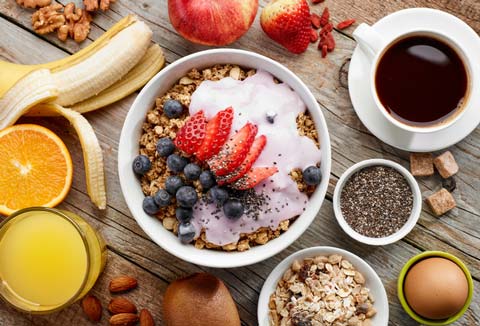About a quarter of Americans skip breakfast. And new research finds this growing habit is causing us to pack on pounds.1
Eating a morning meal jump-starts the body’s digestive processes. It leads to greater calorie burning throughout the day. Those are the findings of an extensive review of recent studies by the American Heart Association (AHA). It found that skipping breakfast is linked to a higher risk of obesity and diabetes.
And it showed that making breakfast the biggest meal of the day can pay big weight loss dividends.
One of the studies cited by the AHA was done by researchers at Loma Linda University School of Public Health. It was published in The Journal of Nutrition.
The researchers looked at the eating habits of more than 50,000 generally healthy adults. They found that eating a robust breakfast and then tapering off to a smaller lunch and a light dinner with no other lifestyle changes caused steady weight loss. Over the course of a year, subjects had a body mass index decrease of up to 5%.2
Eating the meals in the reverse order—light or no breakfast, heavier lunch, and heavy dinner—had the opposite effect. The researchers said it caused weight gain.
Dr. Hana Kahleova is a research fellow in nutrition at Loma Linda University. She led the study. Dr. Kahleova said there are biological reasons the body burns more calories when you front-load your food earlier in the day.
The pancreas is more responsive in the morning. It produces sugar-burning insulin faster. This means the morning is when “our body can use the nutrients as a source of energy the easiest,” she said.3
A person eating a heavier meal in the evening will deposit more of the calories as fat because there’s not enough insulin to burn them, she said.
Her advice?
“Eat breakfast like a king, lunch like a prince, and dinner like a pauper.”4
Israeli researchers found similar results. They recruited 93 obese or overweight women ages 30 to 57. They were all put on identical healthy 1,400-calorie-a-day diets for 12 weeks.
The women were split into groups based on the timing of their meals. Half the women consumed 700 calories at breakfast, 500 calories at lunch, and 200 calories at dinner. The remaining women did the exact reverse. They ate a 200-calorie breakfast, 500-calorie lunch, and 700-calorie dinner.
At the end of the 12 weeks, women in both groups lost weight. But those who ate the big breakfast lost far more. They had dropped 2-½ times as much weight as those who ate a light breakfast.
Dr. Daniela Jakubowicz is professor of medicine at the Wolfson Medical Center in Tel Aviv. She was lead study author. “The time of the meal is more important than what you eat and how much you eat,” she said. “It is more important than anything else in regulating metabolism.”
The AHA review noted that family life often revolves around eating big meals at the end of the day. But if you want to lose weight, “The message is very straightforward: Make breakfast your largest meal of the day, and eat dinner as your lightest meal of the day,” Dr. Kahleova said.5
Editor’s Note: If you want to send your weight loss efforts into overdrive… Discover the secret “switch” that tells your body to burn fat instead of store it… Find out how to unlock your fat-burning potential HERE.
Like this Article? Forward this article here or Share on Facebook.
References:
1 https://www.nytimes.com/2017/08/21/well/eat/the-case-for-a-breakfast-feast.html?rref=collection%2Fsectioncollection%2Fhealth&action=click&contentCollection=health®ion=rank&module=package&version=highlights&contentPlacement=1&pgtype=sectionfront&_r=0
2 https://www.ncbi.nlm.nih.gov/pubmed/28701389
3 https://www.nytimes.com/2017/08/21/well/eat/the-case-for-a-breakfast-feast.html?rref=collection%2Fsectioncollection%2Fhealth&action=click&contentCollection=health®ion=rank&module=package&version=highlights&contentPlacement=1&pgtype=sectionfront&_r=0
4 http://onlinelibrary.wiley.com/doi/10.1002/oby.20460/full
5 http://newsroom.heart.org/news/meal-planning-timing-may-impact-heart-health

